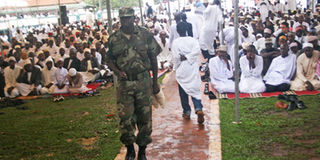Prime
Robbing God: The unbecoming theft in places of worship

A soldier carries his boss’ shoes at Kibuli Mosque. Since muslims are required to take off shoes outside the mosque, thieves have targeted the shoes and many worshippers at the end of the prayers, realise they have lost their shoes, thus resorting to carrying them inside the mosque. Photo by Faiswal Kasirye.
What you need to know:
Not all worshippers are out to pray. Some go to places of worship to steal others’ belongings.
A friend once told me of several incidents of theft that had taken place at their church in the city centre. “Last Sunday, while mummy had left our pew for Holy Communion, a man came and picked up her bag claiming she had asked him to keep it for her,” Jane narrated. She went on to say that the man was accosted outside the church by ushers. “He was taken away to Police and luckily, mummy’s bag was recovered.”
It is no secret that not everyone in a house of prayer is a genuine worshipper. “I found a guy who survived being lynched at church because he was found in the parking lot attempting to unscrew a car headlamp,” another friend narrated. Churches, temples and mosques alike are infested by thieves and conmen. Such characters are always determined to meet their basic needs by ripping off others.
Identity and tricks
According to Hajji Nsereko Mutumba, the spokesperson of the Uganda Muslim Supreme Council, it is shoes which are stolen the most from the Old Kampala mosque. “The unscrupulous fellows walk in dressed like any of the other worshippers and stand at the back. They wait for all the Muslims to prostrate as they pray and then pick up the different pairs of shoes and sneak out. Others steal the free Korans availed in the mosque for worshippers that do not own the holy book. In most cases, it is the non-believers that steal from the Muslims that come to worship.”
Reverend Geoffrey Wilson Kakooza, the Vicar at Namirembe Cathedral says that between 2004 and 2010, theft was rampant. “People reported stolen car parts like headlamps and side mirrors. Others lost their phones,” explains Kakooza. He goes on to say that in most cases, people are reluctant to keep their phones in bags while going for holy communion yet by the time they get back to their seats, their items are gone. “Some people come off as kind seatmates and offer to watch over their seatmates’ property especially the ladies’ bags while they go for Holy Communion. When the lady returns, the kind neighbour is long gone.”
Jane Kobusingye, an ardent worshipper at All Saints Church says that most thefts happen she had heard about, take place during funeral and wedding services. “At funerals, the thieves take advantage of the moment during which mourners are paying last respects. Here, supposed-mourners move towards the casket but women’s handbags and men’s phones are a target by the thieves through the crowd.” Reverend recounts a similar incident at the Late James Wapakhabulo’s funeral. “The former Prime Minister, Apollo Nsibambi’s phone was stolen at the funeral. Problem is, it is hard to tell such bad people apart from the rest of the congregation.”
Coordinated plot
Geoffrey Okello, a member of the Security team at Watoto Church says the thefts are sometimes coordinated. “The thieves that steal from people here at Watoto are the same that disorganise people in other churches like All Saints Cathedral Nakasero and Christ the King Church. They mostly steal window and door switches,” says Okello, adding, “The thieves stalk the worshippers and sit with them. As soon as they get a chance to take something they have targeted, they make off with it.” He says; “Even children are thieves. They borrow tablets from their friends in the name of playing games but end up not returning them.”
Punishment and precautions
Hajji Nsereko, when asked about what they do to the thieves when they catch them, jokingly says they chop off legs of the thieves. “We in most cases, beat those wrongdoers,” he noted.
Okello noted that, “At Watoto, we encourage reconciliation. When we get the thief, we do our best to make him reconcile with the person he has stolen from. In some cases, some thieves become born-again and get to know God. Apart from that, we have a security team that stands out to get the thieves. There are also some volunteers that point out the suspicious characters.”
Vigilant security
Hajji Nsereko says, “We have put security men to watch around for suspicious characters especially those who do not want to prostrate when the others are prostrating.” He adds that some worshippers buy polythene bags in which they put their shoes and place them right next to them during prayers. Others leave their shoes in their cars and wear sandals to the mosque.” At some mosques, there are always some disabled people who are paid about Sh500, to guard shoes till the prayers are finished.
When asked about security measures taken, Reverend Kakooza says, “We try to ensure adequate deployment of security personnel. With this measure, the complaints have reduced.” He also adds that once a suspect is caught, they are taken to the police without wasting any time.




